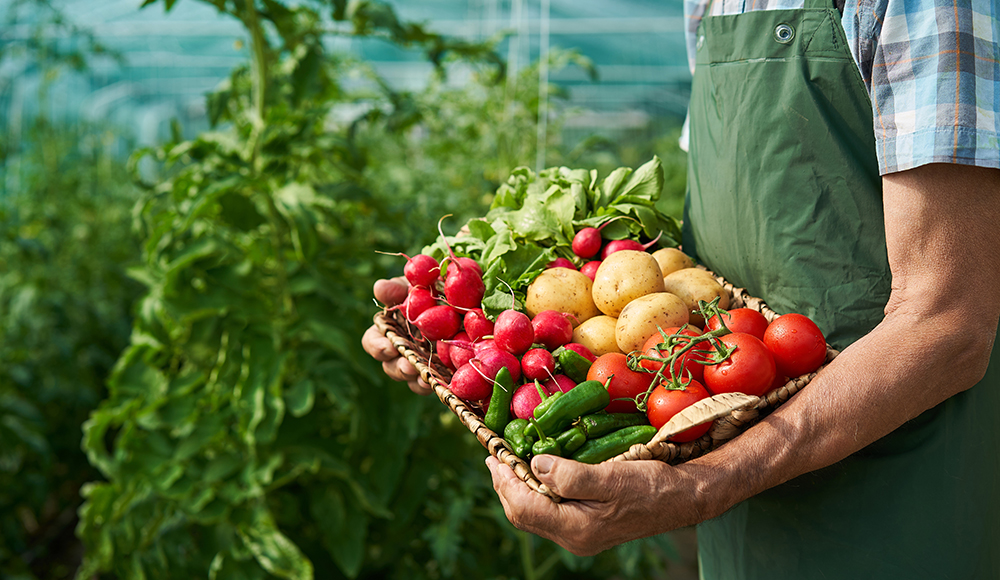Organic Gardening:
In the world of gardening, there’s a method that’s all about going back to nature and keeping things pure and wholesome. It’s called organic gardening. 🌱
Picture this: vibrant, healthy plants growing without any artificial chemicals or pesticides. Sounds pretty cool, right? Well, that’s the magic of organic gardening!
So, what exactly is organic gardening all about? How does it work? And why is it so important for the environment? Let’s dive in and uncover the wonders of this natural approach to gardening. 🌿

Exploring the Wonders of Organic Gardening
Welcome to the world of organic gardening! In this article, we will delve into the fascinating realm of growing your own fruits, vegetables, and herbs in a sustainable and environmentally-friendly way. Whether you have a sprawling backyard or a small balcony, organic gardening offers numerous benefits for you and the planet. From nurturing the soil to avoiding harmful chemicals, organic gardening is a journey that will reward you with bountiful harvests and a deeper connection to nature.
The Organic Advantage: Why Choose Organic Gardening?
When it comes to gardening, choosing organic methods goes beyond just avoiding synthetic fertilizers and pesticides. Organic gardening is a holistic approach that prioritizes the health of both the plants and the surrounding ecosystem. By eschewing harmful chemicals, organic gardeners protect beneficial insects, promote soil fertility, and minimize harm to human health. Plus, organic produce is packed with nutrients, flavors, and an added dose of satisfaction that comes from knowing you’re nourishing your body with food that is as pure as nature intended.
The Science Behind Organic Gardening
Organic gardening is rooted in the principles of ecology, working with nature rather than against it. To successfully grow plants without synthetic inputs, organic gardeners focus on building healthy, living soil. They feed the soil with organic matter like compost, which acts as a buffet for beneficial microbes and earthworms, helping to create a thriving soil ecosystem. This, in turn, leads to better nutrient availability and healthier plants. By nurturing the soil, organic gardeners foster a cycle of life that sustains their gardens year after year.
Organic practices also prioritize biodiversity. By incorporating a variety of plants, organic gardeners attract pollinators and beneficial insects, which keep pests in check naturally. Additionally, crop rotation and companion planting are essential techniques used to prevent the buildup of pests and diseases in the garden. By carefully selecting plant combinations and rotating crops, organic gardeners reduce the need for chemical interventions.
Furthermore, organic gardening takes a proactive approach to pest control. Rather than resorting to synthetic chemical pesticides, organic gardeners rely on natural predators, such as ladybugs and birds, to keep pests in check. They also use physical barriers, like netting or row covers, to protect plants from insects. By maintaining a balance between pests and predators, organic gardeners ensure a healthy garden ecosystem without resorting to harmful chemicals.
Getting Started with Organic Gardening
Ready to embark on your organic gardening journey? Here are a few simple steps to help you get started:
- Prepare your soil: Begin by testing your soil’s pH and nutrient levels. This will help you determine if any amendments are needed. Add compost or aged manure to improve soil structure and fertility.
- Select your crops: Choose plants that are well-suited to your climate and growing conditions. Consider planting a mix of vegetables, fruits, and herbs to promote biodiversity and a varied harvest.
- Plant with care: Follow proper planting techniques, providing adequate spacing and water for each plant. Mulch around your plants to conserve moisture, suppress weeds, and improve soil health.
- Nurture your garden: Regularly monitor your plants for signs of pests or diseases. Use organic pest controls, such as neem oil or insecticidal soap, as a last resort. Encourage beneficial insects and birds to visit your garden by providing water sources and habitats.
- Harvest and enjoy: As your plants mature, harvest your bountiful yields and savor the taste of your organic produce. Share your surplus with friends and family, spreading the joy of organic gardening.
Organic Gardening Tools and Techniques
Now that you understand the core principles of organic gardening, let’s dive deeper into some tools and techniques that will help you optimize your garden’s success:
Composting: Nature’s Black Gold
Compost is the lifeblood of organic gardening. It enriches the soil, helps retain moisture, and provides essential nutrients to your plants. Start composting by collecting kitchen scraps, yard waste, and other organic materials in a compost bin. Mix the materials periodically, ensuring proper aeration and decomposition. In a few months, you’ll be rewarded with nutrient-rich compost that will supercharge your garden.
Intensive Planting: Maximizing Space and Yields
Squeeze the most out of your garden space by practicing intensive planting. This technique involves planting crops closer together to maximize yields and reduce weed growth. By filling every available space with productive plants, you’ll make the most efficient use of your growing area.
Mulching: The Key to Weed Control and Moisture Retention
Mulching not only keeps weeds at bay but also helps conserve soil moisture, regulate soil temperature, and prevent erosion. Use organic materials like straw, wood chips, or shredded leaves as mulch around your plants. Not only will it improve the health of your soil, but it will also save you time and effort in weed control.
Key Takeaways – Organic Gardening:
– Organic gardening is a method of growing plants without the use of synthetic pesticides or fertilizers.
– It focuses on maintaining the natural balance of the ecosystem and promoting biodiversity.
– Composting is an essential practice in organic gardening, as it provides nutrients to the soil and reduces waste.
– Crop rotation is another key technique used in organic gardening to prevent pests and diseases.
– Organic gardening encourages the use of beneficial insects and companion planting to control pests naturally.
Frequently Asked Questions
Organic gardening is a sustainable and environmentally-friendly approach to growing plants, vegetables, and fruits without the use of synthetic pesticides, herbicides, or fertilizers. It promotes natural methods of pest control and soil fertility, relying on biological and organic materials to support plant growth. By implementing organic gardening practices, you can cultivate healthy, chemical-free produce while minimizing harm to the ecosystem. Here are some frequently asked questions about organic gardening:
1. How can I control pests in my organic garden without using harmful chemicals?
Controlling pests in an organic garden requires a multi-faceted approach that focuses on prevention and natural remedies. Start by promoting a healthy garden ecosystem by maintaining proper soil health, encouraging beneficial insects and birds, and rotating crops. You can also use physical deterrents like netting, row covers, and traps to keep pests at bay. For specific pest problems, there are organic pest control options such as neem oil, insecticidal soaps, and beneficial nematodes. It’s important to stay vigilant and regularly monitor your plants for any signs of pest damage so you can take action promptly.
Additionally, fostering biodiversity in your garden helps attract natural predators that feed on pests. Planting companion plants, such as marigolds, basil, and lavender, can help repel certain insects. By incorporating these organic pest control methods and creating a balanced ecosystem, you can effectively manage pests without resorting to harmful chemicals.
2. How can I ensure proper soil health in my organic garden?
Maintaining healthy soil is crucial for organic gardening success. To improve soil health, it’s important to focus on three key aspects: soil structure, nutrient content, and biological activity. Start by adding organic matter, such as compost or well-rotted manure, to enhance the soil’s structure and water-holding capacity. This helps create an environment that encourages beneficial soil organisms and supports root development.
Regularly testing your soil’s nutrient levels can guide you in providing the necessary amendments. Organic fertilizers, like compost tea, seaweed extract, and fish emulsion, can replenish essential nutrients and improve soil fertility. Remember to avoid synthetic fertilizers as they are not allowed in organic gardening. Additionally, practicing crop rotation and using cover crops can help prevent nutrient depletion and control weeds naturally. By prioritizing soil health, you’ll provide a strong foundation for your organic garden and promote the optimal growth of your plants.
3. Can I use pre-made organic fertilizers in my organic garden?
Yes, you can use pre-made organic fertilizers in your organic garden. These fertilizers are derived from natural sources, such as animal manure, bone meal, and composted plant material. They provide the necessary nutrients required for plant growth without the use of synthetic chemicals. It’s important to choose organic fertilizers that are certified for organic gardening to ensure they meet the standards set by organic certification bodies. The packaging should clearly state that the product is suitable for organic use.
Before using any organic fertilizer, it’s advisable to read the instructions and follow the recommended application rates. Overuse of fertilizers, even organic ones, can lead to nutrient imbalances in the soil. Remember that organic fertilizers release nutrients slowly, providing a long-lasting source of nourishment for plants. By utilizing pre-made organic fertilizers, you can support the health and growth of your organic garden while adhering to organic gardening principles.
4. How can I start an organic garden if I don’t have a lot of space?
You can start an organic garden even if you have limited space. Container gardening is a great option for those with small yards, balconies, or even indoor spaces. Choose containers that provide adequate drainage and are large enough for the plants you want to grow. Fill them with organic potting soil and select appropriate varieties of vegetables, herbs, or flowers that thrive in containers.
In addition to containers, vertical gardening techniques, such as trellises or hanging baskets, can maximize space usage. You can grow climbing plants like cucumbers, tomatoes, or beans on trellises, saving valuable ground space. Another space-saving option is using raised beds, which allow for efficient organization and effective soil management. Remember to select organic seeds or seedlings and use organic growing practices like composting and organic pest control.
5. How long does it take to transition to an organic garden?
The time it takes to transition to an organic garden can vary depending on several factors. If you’re starting from scratch, it may take some time to prepare your soil and create a healthy organic environment. This process can range from a few weeks to several months, depending on the condition of your soil and the extent of any chemical residues.
To transition an existing garden to organic, you’ll need to gradually eliminate the use of synthetic fertilizers and pesticides. It’s important to stop using these chemicals and allow the soil and plants to detoxify. This process can take at least one growing season or more, depending on the persistence of the chemicals used in the past. It’s crucial to follow organic gardening practices consistently and patiently to ensure a successful transition.

My Secret to Organic Gardening Success
Summary
Organic gardening is a great way to grow plants without harmful chemicals or pesticides. It helps protect the environment and promotes healthier food. By using natural methods like composting, crop rotation, and companion planting, organic gardeners can create a balanced ecosystem that supports plant growth naturally. This means better-tasting produce and a safer environment for everyone. So, whether you have a big backyard or just a small balcony, give organic gardening a try and enjoy the benefits for yourself.
In conclusion, organic gardening offers a sustainable and eco-friendly approach to growing plants. It emphasizes the importance of working with nature to nurture our plants and protect our planet. So, let’s grab our shovels and join the organic gardening movement. Happy planting!
